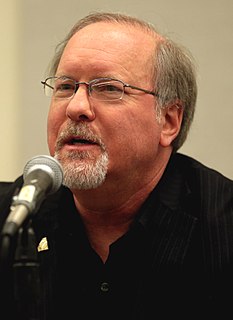A Quote by Sam Harris
Mysticism is a rational enterprise. Religion is not. The mystic has recognized something about the nature of consciousness prior to thought, and this recognition is susceptible to rational discussion. The mystic has reasons for what he believes, and these reasons are empirical. The roiling mystery of the world can be analyzed with concepts (this is science), or it can be experienced free of concepts (this is myticism). Religion is nothing more than bad concepts held in place of good ones for all time. It is the denial-at once full of hope and full of fear-of the vastitude of human ignorance.
Quote Topics
About
All Time
Bad
Believes
Concepts
Consciousness
Denial
Discussion
Empirical
Enterprise
Experienced
Fear
Free
Full
Good
Good Ones
Held
Hope
Human
Ignorance
More
Mystery
Mystic
Mysticism
Nature
Nothing
Once
Place
Prior
Rational
Reasons
Recognition
Recognized
Religion
Science
Something
Susceptible
Than
Thought
Time
World
Related Quotes
For centuries, we in the West have thought of ourselves as rational animals whose mental capacities transcend our bodily nature. In this traditional view our minds are abstract, logical, unemotionally rational, consciously accessible, and, above all, able to directly fit and represent the world. Language has a special place in thie view of what a human is - it is a privileged, logical symbol system internal to our minds that transparently expresses abstract concepts that are defined in terms of the external world itself.
There is some conflict between religion and science in my world, but that's nothing new. Science, at its root, is a rational discipline. Religion, on the other hand, is fundamentally trans-rational. Both of them attempt to solve problems, but since their methodology is vastly different, they can't help but come into conflict.
If I make a stupid decision but don't execute it because I'm, say, lazy, then I'm lucky, not rational. However, at other times a person acts for good reasons just as she does what she thinks she shouldn't do, not knowing that they are good reasons. Just like sometimes we are a lot less rational than we think we are, it is also true that sometimes we are a lot more rational than we think we are.
The experimentalists think that we can only get at our concepts by way of empirical investigation, while the armchair philosophers think that we can skip the experiments and figure things out from our armchairs. What they have in common, however, is regarding our concepts as the targets of philosophical theorising, and I just don't think that, in the vast majority of cases, the subject matter of philosophy has our concepts as its target.
Every morning I'd have coffee with my wife and we would discuss ideas. Sixty percent of what I did for the stores was concepts. The other forty percent was correcting and cleaning up other concepts in house, or doing final art on my concepts. Most of my concepts were so finished they could turn them over to somebody else.
Metaphysics is the study of the most general nature and basic structure of reality, and therefore the concepts of metaphysics, concepts like time, space, identity, resemblance, substance, property, fact, event, composition, possibility, etc., are the most fundamental concepts. Thus metaphysics is the most fundamental theoretical discipline.
I view all art as an effort to translate brain concepts into a work. These brain concepts are synthetic ones - the result of many experiences. But a single work of art, or even a series of works, more often than not cannot translate these synthetic concepts adequately. Yves Saint Laurent once said that he suffered greatly when creating. He is not alone in that. Most artists do the same and say as much.
The fact that modern physics, the manifestation of an extreme specialization of the rational mind, is now making contact with mysticism, the essence of religion and manifestation of an extreme specialization of the intuitive mind, shows very beautifully the unity and complementary nature of the rational and intuitive modes of consciousness; of the yang and the yin.



































